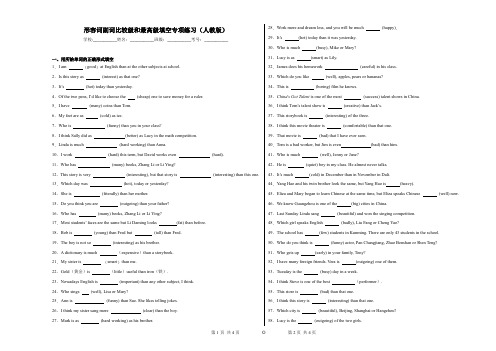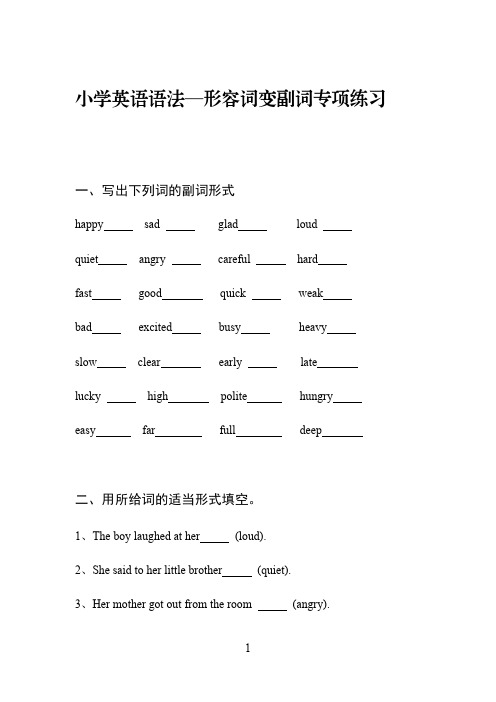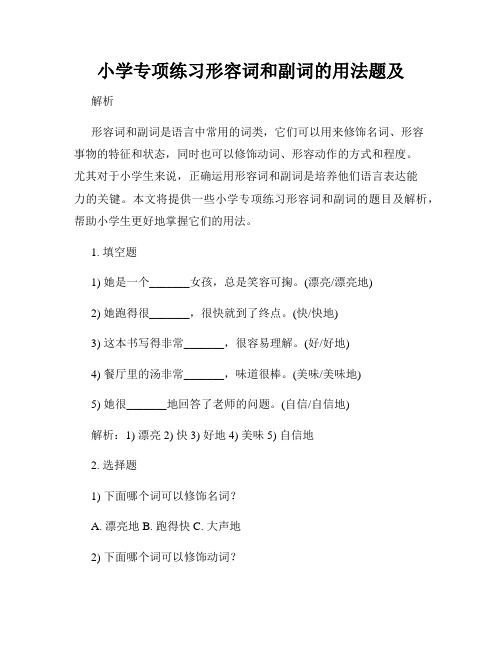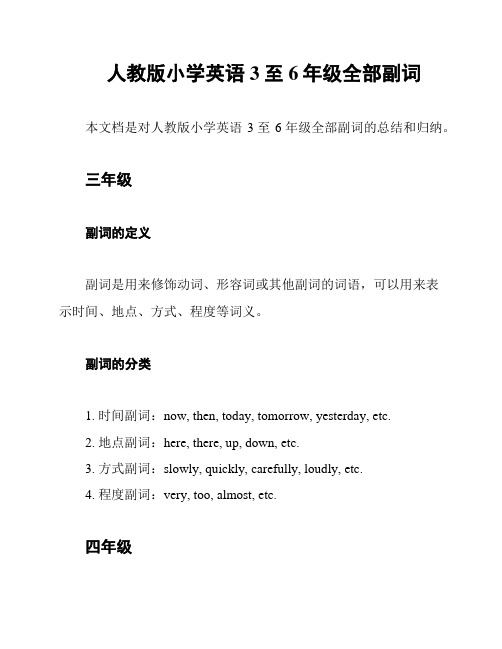人教版小学形容词副词专题
形容词副词比较级和最高级填空专项练习(人教版)

形容词副词比较级和最高级填空专项练习(人教版)学校:___________姓名:___________班级:___________考号:___________一、用所给单词的正确形式填空1.I am (good)at English than at the other subjects at school.2.Is this story as (interest) as that one?3.It’s (hot) today than yesterday.4.Of the two pens, I’d like to choose the (cheap) one to save money for a ruler.5.I have (many) coins than Tom.6.My feet are as (cold) as ice.7.Who is (funny) than you in your class?8.I think Sally did as (better) as Lucy in the math competition.9.Linda is much (hard-working) than Anna.10.I work (hard) this term, but David works even (hard).11.Who has (many) books, Zhang Li or Li Ying?12.This story is very (interesting), but that story is (interesting) than this one. 13.Which day was (hot), today or yesterday?14.She is (friendly) than her mother.15.Do you think you are (outgoing) than your father?16.Who has (many) books, Zhang Li or Li Ying?17.Most students’ faces are the same but Li Daming looks (fat) than before.18.Bob is (young) than Fred but (tall) than Fred.19.The boy is not so (interesting) as his brother.20.A dictionary is much (expensive)than a storybook.21.My sister is (smart)than me.22.Gold(黄金)is (little)useful than iron(铁).23.Nowadays English is (important) than any other subject, I think.24.Who sings (well), Lisa or Mary?25.Ann is (funny) than Sue. She likes telling jokes.26.I think my sister sang more (clear) than the boy.27.Mark is as (hard-working) as his brother.28.Work more and dream less, and you will be much (happy).29.It’s (hot) today than it was yesterday.30.Who is much (busy), Mike or Mary?31.Lucy is as (smart) as Lily.32.James does his homework (careful) in his class.33.Which do you like (well), apples, pears or bananas?34.This is (boring) film he knows.35.China's Got Talent is one of the most (success) talent shows in China.36.I think Tom’s talent show is (creative) than Jack’s.37.This storybook is (interesting) of the three.38.I think this movie theater is (comfortable) than that one.39.That movie is (bad) that I have ever seen.40.Tom is a bad worker, but Jim is even (bad) than him.41.Who is much (well), Jenny or Jane?42.He is (quiet) boy in my class. He almost never talks.43.It’s much (cold) in December than in November in Dali.44.Yang Hao and his twin brother look the same, but Yang Hao is (heavy).45.Eliza and Mary began to learn Chinese at the same time, but Eliza speaks Chinese(well) now. 46.We know Guangzhou is one of the (big) cities in China.47.Last Sunday Linda sang (beautiful) and won the singing competition.48.Which girl speaks English (badly), Liu Fang or Cheng Yao?49.The school has (few) students in Kunming. There are only 43 students in the school. 50.Who do you think is (funny) actor, Pan Changjiang, Zhao Benshan or Shen Teng? 51.Who gets up (early) in your family, Tony?52.I have many foreign friends. Vera is (outgoing) one of them.53.Tuesday is the (busy) day in a week.54.I think Steve is one of the best (performer).55.This store is (bad) than that one.56.I think this story is (interesting) than that one.57.Which city is (beautiful), Beijing, Shanghai or Hangzhou?58.Lucy is the (outgoing) of the two girls.参考答案:1.better【详解】句意:我的英语比学校的其他科目好。
(完整版)小学英语语法—形容词变副词专项练习

小学英语语法—形容词变副词专项练习一、写出下列词的副词形式happy sad glad loudquiet angry careful hardfast good quick weakbad excited busy heavyslow clear early latelucky high polite hungryeasy far full deep二、用所给词的适当形式填空。
1、The boy laughed at her (loud).2、She said to her little brother (quiet).3、Her mother got out from the room (angry).4、“Thank you!” said the lion (happy).5、The mouse walk past the room (careful).6、Sam was (angry) and he hit the ball (hard).7、He opened the present (slow).8、Tim got hurt and he cried (sad) on the floor.9、Jack is running (fast) in the playground.10、The man was tired, he walked (slow) on the pavement.11、He is very (hungry) and can not run (fast).12、The children are talking about their hobbies (excited).13、Please look at the blackboard (careful).14、Be (careful)! There is a car running to you (quick).15、The woman is shouting at her son (loud).16、Listen! The birds are singing songs (happy).17、Lily is a (quiet) girl, she is reading (quiet).18、Listen (care)! The teacher is looking at you.19、The hole is too (deep) , Sam can not reach it.20、He brings some water (quick) and pours it into the hole.21、I can play table tennis very (good).22、She is a (good) swimmer and she can swim (good).23、You should study (hard) in the school.24、My grandmother told us a (sad) story, all of us are (sad).25、“ Please don’t eat me!” said the mouse (quiet).26、All of the students cheered for them (loud).27、I usually get up (early) in the morning.28、“Don’t go to school (late)!” said her mother (loud).29、She finishes her homewok (easy).30、She’s (luck). Her kite flies (high) in the sky.。
形容词与副词(课件)下学期六年下册英语人教PEP版

2.His schoolbag is old . He wants a new one.
3.Her umbrella is cheap . It’s not expensive .
4.This bear is fat . That monkey is 5.—Is it very hot tomorrow?
四、仿照例子,完成句子。 例:Changchun is a small city. Beijing is a big city.
Changchun is smaller than Beijing. 1.Carl’s box is big. Jim’s box is small.
Carl’s box is bigger than Jim’s.
.
A.good
B.better
C.well
( C )10.Mike went for a walk with Bill and his cousins
.
A.every afternoon B.tomorrow afternoon C.yesterday afternoon
二、从方框中选出合适的单词完成句子。
This is a green T-shirt . 3.It’s colder in Harbin than in Sanya.(同义句转换)
It’s hotter in Sanya than in Harbin . 4.I went to Sanya by plane last summer.(对画线部分提问)
3.My grandma is old . She is 62 years old.
4.Today is Sunday. My mother is washing clothes. She is very busy . 5.There is a tree in our garden. It is short . It’s only 1.5 metres tall.
小学专项练习形容词和副词的用法题及

小学专项练习形容词和副词的用法题及解析形容词和副词是语言中常用的词类,它们可以用来修饰名词、形容事物的特征和状态,同时也可以修饰动词、形容动作的方式和程度。
尤其对于小学生来说,正确运用形容词和副词是培养他们语言表达能力的关键。
本文将提供一些小学专项练习形容词和副词的题目及解析,帮助小学生更好地掌握它们的用法。
1. 填空题1) 她是一个_______女孩,总是笑容可掬。
(漂亮/漂亮地)2) 她跑得很_______,很快就到了终点。
(快/快地)3) 这本书写得非常_______,很容易理解。
(好/好地)4) 餐厅里的汤非常_______,味道很棒。
(美味/美味地)5) 她很_______地回答了老师的问题。
(自信/自信地)解析:1) 漂亮 2) 快 3) 好地 4) 美味 5) 自信地2. 选择题1) 下面哪个词可以修饰名词?A. 漂亮地B. 跑得快C. 大声地2) 下面哪个词可以修饰动词?A. 蓝色的B. 悄悄地C. 很高3) 下面哪个词可以修饰形容词?A. 非常B. 潇洒地C. 缓慢4) 下面哪个词可以修饰副词?A. 仔细地B. 红色的C. 高高地5) 下面哪个词既可以修饰名词,又可以修饰动词?A. 安静B. 轻轻地C. 优秀解析:1) A 2) B 3) A 4) B 5) B3. 完成句子1) 她唱歌_______(美妙),我们都很喜欢听。
2) 小狗跑得_______(快),追不上它。
3) 周末的天气很_______(好),我们一起去郊游吧。
4) 她写字很_______(认真),每个字都写得很工整。
5) 他说话声音很_______(大),引起了大家的注意。
解析:1) 美妙地 2) 快 3) 好 4) 认真 5) 大声通过以上练习,小学生可以巩固和提高对形容词和副词的认识和运用能力。
希望这些练习对小学生的学习有所帮助。
综上所述,形容词和副词是日常语言中不可或缺的一部分,正确地运用它们能够丰富语言表达,增强交流能力。
人教版小学英语3至6年级全部副词

人教版小学英语3至6年级全部副词本文档是对人教版小学英语3至6年级全部副词的总结和归纳。
三年级副词的定义副词是用来修饰动词、形容词或其他副词的词语,可以用来表示时间、地点、方式、程度等词义。
副词的分类1. 时间副词:now, then, today, tomorrow, yesterday, etc.2. 地点副词:here, there, up, down, etc.3. 方式副词:slowly, quickly, carefully, loudly, etc.4. 程度副词:very, too, almost, etc.四年级副词的用法1. 用来修饰动词:He runs quickly.(他跑得很快。
)2. 用来修饰形容词:She is very beautiful.(她非常漂亮。
)3. 用来修饰其他副词:He speaks English very fluently.(他的英语讲得非常流利。
)副词的比较级和最高级1. 比较级:通常在形容词和副词前加 er 来表示,也可以在前面加 more。
如:fast - faster, more quickly; tall - taller, more tall.2. 最高级:通常在形容词和副词前加 est 来表示,也可以在前面加 most。
如:fast - fastest, most quickly; tall - tallest, most tall.五年级副词的位置1. 修饰动词时,通常放在动词后面。
如:He speaks English fluently.(他的英语讲得流利。
)2. 修饰形容词时,通常放在形容词前面。
如:She is extremely kind.(她非常友善。
)3. 修饰其他副词时,通常放在其他副词前面。
如:He speaks English very fluently.(他的英语讲得非常流利。
)副词的注意事项1. 不要把副词和形容词混淆。
小学英语语法专题训练:形容词副词(含答案)

小学英语语法专题训练:形容词副词一、单选题(共44题;共88分)1.Sam can't watch TV, and he is .A. unhappyB. unluckyC. happy2.—How is a Chinese ink painting, Mum?—It's in .A. colourfulB. black and whiteC. blue and white3.The Wangs are , but they are very happy.A. richB. poorC. angry4.Jane runs than me.A. fastB. fastestC. faster5.Some stories are I like "The wind and the sun“.A. plasticB. well-knownC. lazy6.Andersen was a (n) writer.A. DanishB. EnglishC. AmericaD. Germany7.The woman is seventy,but she looks so .A. tallB. youngC. old8.—The traffic light is . We can go now.—OK!A. yellowB. redC. green9.My brother is 1.61 metres. I am 1.55 metres. He is than me.A. olderB. longerC. taller10.I feel ________. I am going to see a film.A. happyB. sickC. well11.It's a _______ day. Let's go to the park.A. sunB. sunnyC. rainy12.—How often do you go to the park?—I _______ go to the park.A. likeB. alwaysC. don't13.Christmas is my ________festival.A. likeB. loveC. favourite14.—Do you miss your family?—________.A. Some timesB. SometimesC. Some time15.Sorry, you ________, Xiaoyong.A. are outB. goodC. be quiet16.I often eat bananas, but I______ eat apples.A. oftenB. alwaysC. never17.My parents and I ________ like the Spring Festival.A. allB. bothC. too18.—Is there __________ milk in the bottle?—Yes, there is ________ in the bottle.A. some; anyB. any; someC. some; some19.Are there _______ boys in the classroom?A. anyB. someC. much20.I have________ paper on the desk. I want to make________ paper planes.A. many; manyB. a lot of; manyC. much; muchD. many; a lot of21.I like oranges. John likes oranges, ______________.A. toB. alsoC. either22.We must stop at _____________ light.A. greenB. yellowC. red23.She can jump __________________ than her brother.A. fasterB. fastC. higherD. high24.It's_______________ to play the piano.A. easyB. closeC. sameD. luck25.My mother is not a teacher. My father is not a teacher, ______.A. tooB. eitherC. also26.The jacket is not too expensive. I have ______ money.A. enoughB. muchC. many27.The children listen______ to their teacher.A. carefulB. carefullyC. loudly28.Jenny's dictionary is ______ than mine.A. biggerB. bigC. big than29.Look at the diamond watch. It's ______ one in the shop.A. most expensiveB. more expensiveC. the most expensive30.I think parrots are ___________ animals.A. the excitingB. more than excitingC. the most exciting31.Hurry up! There isn't ________.32.Let's have some ______ first.A. funnyB. funC. excited33.Mike has ______eggs every week.A. a fewB. a littleC. much34.I must run ______on the road.A. slowB. quickC. quickly35.The little chicken can't find her way .A. homeB. to homeC. for home36.We should do more things to keep the Earth clean and______.A. dirtyB. healthyC. unhealthy37.Tim was _________last year, but now he's ______.A. cute, prettyB. short, tallC. small, pretty38.Is there _______milk in the fridge now?A. someB. lotC. anyD. many39.We should write on ________ sides of paper.A. everyB. bothC. all40.We must stop cutting down ________ trees.A. muchB. so muchC. so many41.Shh! Boys and girls, we must keep ________ here.A. cleanB. quietC. cool42.We ________ need air to keep us alive.A. allB. tooC. both43.We saw ants, bees, butterflies and ________ insects.A. othersB. otherC. the other44.I don't like that film. It's ________.A. funB. boringC. exciting二、语法填空(共6题;共6分)45.This is a ________ (China) idiom book.46."How can I get out?" asked the lion ________ (sad).47.The sun is________ (big) than the moon.48.That's the ________ (tall) dinosaur!49.I can also dance ________(good).50.I lose my bag and I feel ________ (happy).答案解析部分一、单选题1.【答案】A【考点】形容词【解析】【分析】句意是Sam不能看电视,他不开心。
形容词副词必记
1、常见形容词后缀1. 名词+ysun—sunny阳光充足的wind—windy多风的fun—funny滑稽的fog—foggy有雾的rain—rainy多雨的2. 动词+ableportable手提的,便携式的reliable a. 可信赖的,可依靠的unbearable无法接受的valuable贵重的fashionable时尚的;流行的3. 名词+alnation—national国家的education—educational教育的nature—natural天然的addition—additional附加的Function--functional 实用的,功能的4. 名词+enwood—wooden木制的gold—golden金色的5. 动词+entdiffer—different不同的insist—insistent坚持的6. 名词+ishfool—foolish愚蠢的self—selfish自私的boy—boyish顽皮可爱的child—childish孩子气的7. 动词+iveact—active积极的impress—impressive印象深刻的8. 名词+fulpower—powerful强有力的peace—peaceful和平的beauty—beautiful美丽的wonder—wonderful精彩的help—helpful有帮助的faith—faithful忠诚的shame—shameful可耻的thank—thankful感谢的9. 名词+ous danger—dangerous危险的courage—courageous勇敢的fame—famous著名的envy—envious羡慕的;妒忌的10. 名词+lyfriend—friendly友好的order—orderly有秩序的time—timely及时的month—monthly每月的year—yearly每年的day—daily每天的11. 动词+ingdepressing令人沮丧的;convincing令人信服的exhausting令人筋疲力尽的amazing令人惊喜的disgusting令人厌恶的;12. 动词+edannoyed生气的,烦恼的confused感到困惑的embarrassed感到尴尬的terrified感到害怕的inspired 卓越的;凭灵感创作的;13. 名词+ousadventurous冒险的ambitious有雄心的;有抱负的continuous 持续的dangerous危险的mountainous多山的mysterious神秘的2.常见含比较级短语19例change for the better变得更好;change for the worse变得更糟;no better than并不比……好;worse still更糟糕的是;to make matters worse更糟糕的是;even worse更糟糕的是;what is worse更糟糕的是;go from bad to worse每况愈下,越来越糟;be worse off情况更差,更加贫困;more or less或多或少;all the more越发,更加;the more, the better越多越好;more than不仅仅;no more than仅仅,只有;not more than不超过,最多;what’s more而且;still less更不用说;sooner or later迟早It is better to be safe than sorry事后追悔不如事前稳妥。
人教版小学语文六年级上册形容词及副词汇总
人教版小学语文六年级上册形容词及副词
汇总
在人教版小学语文六年级上册中,我们研究了许多形容词和副词。
这些词汇可以帮助我们描述事物的特征和进行更加准确的表达。
以下是一些重要的形容词和副词的汇总:
形容词
形容词是用来描述名词的词语,可以帮助我们了解事物的性质、特征和状态。
1. 善良的:好心肠,乐于助人的
2. 聪明的:智慧,机智的
3. 勇敢的:无畏,大胆的
4. 美丽的:漂亮,具有吸引力的
5. 可爱的:讨人喜欢,迷人的
6. 幸福的:快乐,满足的
7. 悲伤的:忧伤,不快乐的
8. 高兴的:愉快,心情好的
9. 快乐的:欢乐,开心的
副词
副词是用来修饰动词、形容词或其他副词的词语,可以用来描
述动作的方式、程度和时间。
1. 很:表示程度,非常,十分
2. 非常:程度词,非常,极其
3. 快:表示速度,迅速地
4. 慢慢地:表示缓慢地
5. 小心地:表示小心地
6. 立刻:表示时间,马上,立即
7. 过去:表示时间,以前,过去时
8. 真正地:表示真实地
9. 已经:表示时间,早已,已经了解的
以上是人教版小学语文六年级上册的形容词和副词的汇总。
通
过学习这些词汇,我们能够更好地描述事物,丰富我们的表达能力。
希望这份汇总对你有帮助!。
(完整版)小学英语形容词副词专项练习
Name _____________ Date _____________III 圈出正确的选项1.Snow White is a (beautiful, beautifully) girl.2. The dog is dancing (happy, happily).3.He is (angry, angrily) with me. 4 Listen (careful, carefully).5.Don’t drive so (quick, quickly). 6 He looks (tired, tiredly) today.IV翻译(1)比较级的常用句型: 比较级+ than。
如I am taller than you. /I work harder than you./Who is richer, Ma Yun or Wang Jianlin?1.海豚比鲸鱼游得快。
_____________________________________________________________2.我比我爹起得早。
_______________________________________________________________3.Messi的足球踢得比Beckham好。
_________________________________________________4.张老师和范冰冰谁更漂亮?_______________________________________________________5.语文和数学,哪科更容易?_________________________________________________________(2)最高级常用句型: the + 最高级。
如Who is the richest man in the world? Bob is the tallest boy in our class.6.世界上最小的鸟是什么鸟?_________________________________________________________7.大象是最大的陆地动物。
最新人教pep版小学英语毕业专项复习——第二部分 词类梳理 第五节形容词和副词
返回目录
四、形容词和副词的比较级和最高级 大多数形容词和副词有三个等级:1. 原级(即原形); 2. 比较级,意为“更……”;3. 最高级,意为“最……”。
返回目录
1. 形容词和副词的比较级和最高级的变化规则 (1)规则变化
规则
原级 比较级
一般情况下,比较级在词 great 尾加-er,最高级在词尾加 tall
返回目录
He runs faster than Tom. 他跑得比汤姆快。 This house is much bigger than that one. 这间房子比那间要大得 多。 Lily is a little thinner than Lucy. 莉莉比露西瘦一点。
返回目录
(2)“形容词比较级+and+形容词比较级”,意为“越来 越……”。如: It is getting hotter and hotter. 天气变得越来越热了。 (3)“the+形容词比较级,the+形容词比较级”,意为 “越……,就越……”。如: The more, the better. 越多越好。 (4)最高级用于三者或三者以上的人或物的比较,表示人或物 在某个范围内“最……”。如:
返回目录
续表
规则
原级
比较级
最高级
以重读闭音节结尾且词尾只有
一个辅音字母的词,比较级先
fat
双写最后一个辅音字母,再加 thin
-er;最高级先双写最后一个辅 big
音字母,再加-est
wet
fatter thinner bigger wetter
fattest thinnest biggest wettest
返回目录
考点精练
考点1 考查形容词、副词的词形变换 【例1】Read and write. 请仔细观察下面左排的单词,根据其变
- 1、下载文档前请自行甄别文档内容的完整性,平台不提供额外的编辑、内容补充、找答案等附加服务。
- 2、"仅部分预览"的文档,不可在线预览部分如存在完整性等问题,可反馈申请退款(可完整预览的文档不适用该条件!)。
- 3、如文档侵犯您的权益,请联系客服反馈,我们会尽快为您处理(人工客服工作时间:9:00-18:30)。
人教版小学形容词副词专题一、形容词
1.形容词的分类
1)简单形容词
品质形容词:quiet, good ........
颜色形容词:yellow, red, green, purple..
类属形容词:free, open .....
强调形容词:real, true .....
(2)复合形容词
复合形容词一般是由两个及两个以上的词构成。
Eg :hard- working, warm-hearted
2. 形容词的用法
(1)作定语,一般放在所修饰词的前面
Eg :She is a nice girl. 她是个好女孩。
后面。
(2)作表语,放在系动词(am, is, are, feel, taste ........ )
Eg:My uncle looks young. 我叔叔看起来很年轻。
3)作宾语补足语,一般紧跟在宾语后面
Eg:The new present makes me happy. 新礼物让我高兴。
(4)修饰something, anything, nothing, everything 等复合不定代词时,形容词通常放在他们后面。
Eg:I would like something hot to drink. 我想喝些热饮料。
(5)表示长宽高深及年龄的形容词,放在相应的名词后面。
Eg:My uncle is 1.8 meters tall. 我叔叔身高1.8 米。
(6)有的形容词只能作表语,如afraid, alone, asleep, awake, alive, well, ill, frightened.
Eg: —What' s the matter? 怎么了?
—I ' m ill. 我生病了。
(7)有的形容词只能作定语,如little, only, wooden, woolen, elder.
Eg: I ' m the only child in my family. 我是家里的独子。
(8)有的形容词加上定冠词the 可以泛指一类人或整体,谓语动词用复数。
Eg :We shouldn' t laugh at the poor. 我们不应该嘲笑穷人。
3. 形容词的排列顺序
多个形容词修饰一个名词时,其排列顺序则由它们和被修饰的名词之间的密切程度而定。
与被修饰名词关系越密切的、描述越具体的形容词越靠近被修饰词。
一般情况下顺序为:限定词(冠词,人称代词,指示代词,形容词性物主代词,数词等)—描绘词(大小,长短,形状,新旧或年龄,颜色)-来源或出处一材料性质一类别一名词。
Eg:My small old blue bag. 我的旧的蓝书包。
二、副词
1. 副词的分类
副词大体上分为时间副词(yesterday, now, tonight) ,地点副词(here, there, back) ,方式副词(carefully, fast, quietly) ,程度副词(very, too, much) ,疑问副词(what, why, when),频率副词(often, always, usually),否定副词(not),关系副词(where, why, when)和连接副词(so, then)。
2. 副词的用法
( 1)修饰动词,通常放在被修饰动词的后面。
Eg :David jumps high. 大卫跳得很高。
( 2)修饰形容词和副词,通常放在被修饰词的前面。
Eg :His trousers are too long. 他的裤子太长了。
Thank you very much! 非常感谢!
3)时间副词,地点副词和方式副词一般放在句末
Eg:They went to the zoo yesterday. 他们昨天去了动物园
Please put the vase here. 请把花瓶放在这儿。
He picked up the note quickly. 他迅速地捡起来了纸币。
(4)频率副词一般放在be 动词、情态动词或助动词之后,实意动词之前。
Eg :He is always late for school. 他上学总是迟到。
I usually get up at six in the morning. 我通常早上6 点起床。
(5)程度副词一般修饰形容词和副词,放在所修饰的前面。
Eg :It 's much colder today than yesterday. 今天比昨天冷多了。
(6)疑问副词通常放在句子开头。
Eg:When is your birthday? 你的生日在什么时候?
3. 副词的排序
如果句末同时有几个副词时,它的顺序如下:程度副词T方位副词一地点副词T时间副词。
其中,当副词表示地点时,小地点在前,大地点在后;当副词表示时间时,具体时间在前,笼统时间在后。
Eg:My father goes jogging along the street at 7:30 every morning. 我父亲每
天早上7:30 沿着这条街慢跑。
4. 部分形容词转换成副词的规则
(1)一般情况下,在形容词词尾直接加-ly变成副词
quick-quickly, slow-slowly, quiet-quietly, careful-carefully, beautiful-beautifully
(2)以y结尾的形容词变副词,一般将y变i再加-ly。
happy-happily, easy-easily
(3)以-le结尾的形容词变副词,一般是去e再加-y。
simple-simple
5. 形容词和副词的比较等级的构成
形容词和副词有三个比较等级:原级、比较级和最高级。
形容词和副词比较等级的规则变化
形容词和副词比较等级的用法
(1)形容词和副词原级的用法
肯定结构的形式是“as+原级+as”意为“……和……一样”;否定结构的形式是“not
as+原级+as”或“ not so + 原级+as”,意为“不如
Eg:I'm as strong as my uncle. 我和叔叔一样强壮。
、
She doesn ' t jump as/so far as you.
(2)形容词和副词的比较级
其结构为“比较级+tha n+.... ”,意为“……比……更……”。
Eg:My schoolbag is heavier than yours. 我的书包比你的书包重。
Mike gets up earlier than John. 迈克起床比约翰早。
(3)形容词和副词最高级的用法。
其结构为“ the+最高级+名词+比较范围”,意为“......... 最... ”。
注意:形容词的最高级前通常加定冠词the,副词最高级前的the通常可以省略。
Eg:He is the strongest boy in his class. 他是班上最强壮的男孩。
She jumps highest in the class. 她在班上跳的最高。
